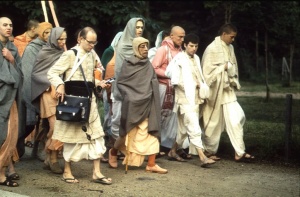SB 1.1.9

A.C. Bhaktivedanta Swami Prabhupada
TEXT 9
- tatra tatrāñjasāyuṣman
- bhavatā yad viniścitam
- puṁsām ekāntataḥ śreyas
- tan naḥ śaṁsitum arhasi
SYNONYMS
tatra — thereof; tatra — thereof; añjasā — made easy; āyuṣman — blessed with a long duration of life; bhavatā — by your good self; yat — whatever; viniścitam — ascertained; puṁsām — for the people in general; ekāntataḥ — absolutely; śreyaḥ — ultimate good; tat — that; naḥ — to us; śaṁsitum — to explain; arhasi — deserve.
TRANSLATION
Please, therefore, being blessed with many years, explain to us, in an easily understandable way, what you have ascertained to be the absolute and ultimate good for the people in general.
PURPORT
In Bhagavad-gītā, worship of the ācārya is recommended. The ācāryas and gosvāmīs are always absorbed in thought of the well-being of the general public, especially their spiritual well-being. Spiritual wellbeing is automatically followed by material well-being. The ācāryas therefore give directions in spiritual well-being for people in general. Foreseeing the incompetencies of the people in this age of Kali, or the iron age of quarrel, the sages requested that Sūta Gosvāmī give a summary of all revealed scriptures because the people of this age are condemned in every respect. The sages, therefore, inquired of the absolute good, which is the ultimate good for the people. The condemned state of affairs of the people of this age is described as follows.